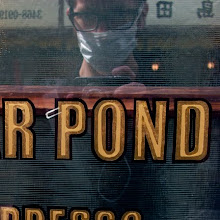Kiyoshi Kurosawa is another dope director, who for better or worse has been dumped into the far-reaching (and by now mostly diluted and exhausted J-Horror genre). I write this w/ particular disdain b/c Kurosawa, for the longest time, for me anyway, kept a grip on the psychological aspect of horror w/out resorting to extreme violence and perversion that can weigh down proper J-Horror films — esp. those catering to Western audiences (and this means ANY J-Horror film remade into an American horror film). Kurosawa's best films inject you with a deep, gnawing feeling of dread that never lets up until long after the credits have rolled. And in advance of his double-header "Revenge" films (despite their obscure status stateside, they predate the first part of Park Chan-wook's famous 'Revenge Trilogy' by five years and, while also predating Kurosawa's J-Horror films, bear many elements found in his future works, like the hardboiled loner crimefighter) — I'm speaking of "The Revenge: A Visit from Fate" and "The Revenge: A Scar That Never Fades" — at the Lincoln Center, part of the Film Comment Selects series, I present my updated discourse on Kurosawa.
I've been a fan since randomly encountering "回路/Kairo" (2001, billed as "Pulse" in the States, and this was before that wack American-director remake from 2006), @ IFC Center, this extra-spooky ghost-in-the-Internet thriller with lots of cute girl actors (led by Kumiko Asō). This one probably epitomizes the traditional J-horror ideal (and by that I mean way back to '幽霊', like Japanese ghost stories, long black hair and floating spectres etc), w/ its slow-moving ghosts and glowing red eyes, but its focus on suicide and loneliness in the afterlife is signature psychological Kurosawa.
Which brings me to the loose quartet of Kōji Yakusho (non-Japanese viewers will probably sooner remember Yakusho from "Babel" — he was the dad to Rinko Kikuchi — or "Memoirs of a Geisha", as the disfigured Nobu) films, starting w/ the classic "キュア/Cure" (1997), which begins relatively light and then, after a jarring scene of violence, pitches down a rabbit-hole of psychosomatic trauma. You'll never look at a lighter's flame quite the same way, after viewing "Cure". And while Yakusho the detective is tracking, accosting, and attempting to psychoanalyze the murder, he's got his own problems at home via his mentally disturbed wife. This is one of Kurosawa's strengths: he gets at the hero from all sides, not only from the dangers of the outside world but by shattering the comforts of their personal life. "降霊/Seance" (2001) freaked me out with its harbingers of future Kurosawa films. The plot centers around Yakusho and his psychic wife Junko and a kidnapped little girl, but seemingly random bits thrown in strike sharply to what's in store for later. Like Junko seeing a ghostly woman in red trailing after a salaryman (see "叫/Retribution"), or Yakusho's brief, odd encounter with his doppelganger (that would be "ポッペルゲンガー/Doppelganger" obvs). Which brings me to "Doppelganger" (2003), which I thought was brilliant and shows Yakusho's incredible range as an actor b/c he has to play two guys: the uptight yet brilliant inventor and his sarcastic, superegoist double (it helps if you understand Japanese to catch all the wry slang thrown out by 2nd Yakusho, but even if you don't you'll probably catch it due to Yakusho's hangdog expressions). And what's esp. wild about Kurosawa's direction is that "Dpppelganger" begins as a typically spooky J-Horror-esque film, from the start to where Yakusho discovers his double leering at him. But then...subtly but surely, the film digresses into this strange and eventually rather lighthearted road movie, with Yakusho and costar Hiromi Nagasaku practically high-fiving and breaking into song-and-dance @ the end. Then we have "Retribution" (2006, whose proper title means "Scream" in Japanese and no way can you bill another film by that title after the spooky mask, sequel-inducing garbage produced by that series), which opened 2007's NY Asian Film Festival. Kurosawa returns to his extra-creepy, psychologically-driven horror roots, and Yakusho plays the grizzled, disturbed detective once again. His home life seems oddly calm via an eternally understanding girlfriend (no spoilers here), but something is up with the bizarre drownings in an unrecognizable, industrial neighborhood of Tokyo. And the ghostly woman in red?? She's the main antagonist, with a shriek like a car alarm. And the ending?? Classic Kurosawa. You thought "Cure" was obscure, where you had to watch it a few times to see what exactly Yakusho is up to? And "Doppelganger" a bit too fun? Wait til you reach the end of "Retribution" (hint: bring Kleenex).
I believe Kurosawa's latest film "Tokyo Sonata" (2008) which hit the IFC last March for a proper two-week-ish screening, not part of a festival or anything, introduced the director to a wider, Western audience. This is a realist psychological family drama (which he alluded to in "Seance"), bit more commercial-friendly but playing to all his strengths of this directorial style. And it came highly lauded from the international festival circuit and has been picking up awards (Cannes etc). But word of advice, if you want to do it right before "Revenge", if you've any inkling of interest in this director, begin with "Cure" (or for a big name experience outside Kōji Yakusho's films, try "明るい未来/Bright Future" from 2003, starring the dreamy duo of Tadanobu Asano and Jō Odagiri — sorta like if Johnny Depp and James Franco teamed up in a film) and see what Kurosawa's all about.
skip to main |
skip to sidebar

